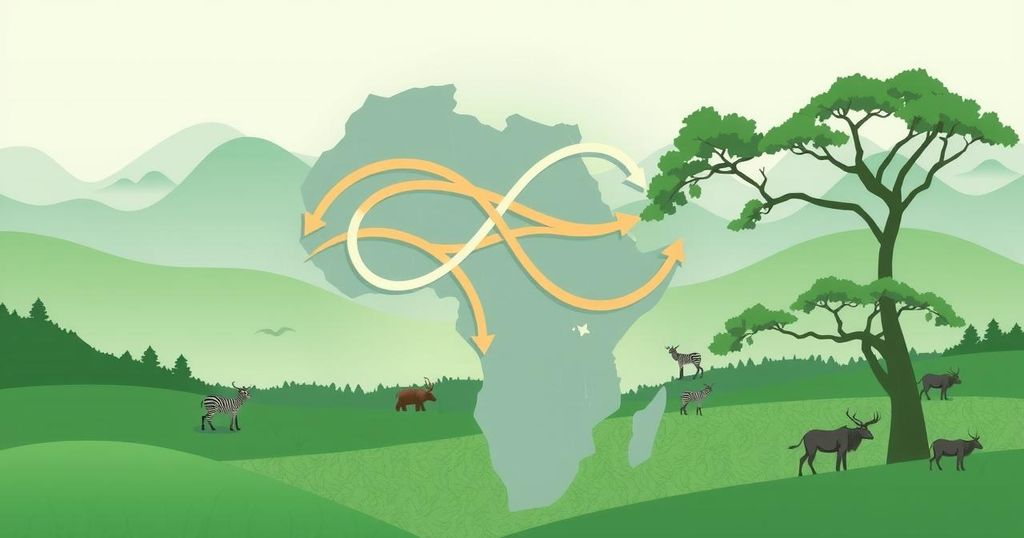The DRC crisis, fueled by M23 rebel activity, involves multiple regional players including Rwanda, Burundi, and Uganda, each with unique motivations related to security and resource acquisition. President Tshisekedi aims to reclaim lost territory while attributing blame to Rwanda for escalated violence. Diplomatic tensions arise as Rwanda defends its actions, while Burundi fears encroachment and Uganda’s role remains contentious amid its anti-militant operations. South Africa’s involvement further highlights the divide between regional alliances depending on their perspectives on the conflict.
The human and diplomatic crisis in the Democratic Republic of Congo (DRC) is escalating due to the seizure of territory by M23 rebels in the mineral-rich eastern region. Neighboring countries have deployed troops, showcasing a history of foreign influence in the conflict. The DRC, which occupies a substantial area comparable to two-thirds of Western Europe, is actively attempting to unify its regional partners in addressing the violence through an emergency summit.
President Félix Tshisekedi of the DRC is under significant pressure to reclaim lost territory, specifically targeting Goma, the largest eastern city. He accuses Rwandan President Paul Kagame of supporting the M23 with military resources to destabilize the DRC and exploit its mineral deposits, despite international calls for action against Kigali’s alleged interference. Tshisekedi’s governance is threatened as the ongoing conflict may encourage opposition forces within the DRC.
Rwanda, led by President Kagame, adopts a defensive stance regarding accusations of military support to the M23. The Rwandan government deflects blame, arguing that their involvement centers on combating factions that threaten Rwandan security. Rwanda aims to establish itself as a stabilizing force while securing economic interests in the DRC’s vast mineral resources, despite repeated denials of smuggling allegations. Analysts suggest displaced tensions revolve around Kagame seeking to assert dominance over Tshisekedi.
Burundi, bordering both Rwanda and the DRC, perceives the situation as a potential security threat. With its army engaged in the conflict against the M23, Burundi’s leadership expresses concerns about the consequences of Rwandan military actions extending closer to its borders. President Evariste Ndayishimiye emphasizes that Burundian sovereignty must be safeguarded against Rwandan ambitions, explicitly warning against the possibility of conflict spilling over into his nation.
While Uganda is involved in combating militants aligned with the Islamic State, its relationship with the M23 remains ambiguous. Reports indicate possible collaboration, with allegations of Uganda providing a support base for M23 operations. Uganda’s involvement aims to protect its interests over claims of national security. Analysts indicate that Uganda’s strategy reflects a desire not to lose influence in the eastern DRC amid the ongoing tensions with Rwanda.
South Africa has deployed significant forces to support the Congolese army against rebels, but tensions have arisen with Rwanda following allegations of Rwandan aggression resulting in casualties among South African troops. This friction highlights the broader schism between the East African Community and the Southern African Development Community regarding their approaches to the DRC conflict. The Southern bloc condemns the Rwandan actions while prioritizing the DRC’s territorial integrity.
The ongoing crisis in the Democratic Republic of Congo stems from the activities of M23 rebels and the involvement of neighboring countries, notably Rwanda, Burundi, and Uganda. The DRC is rich in minerals, exacerbating the stakes as foreign interventions echo the long-standing conflicts attributed to regional rivalries and resource exploitation. The complexities of each nation’s objectives intertwine with internal DRC politics, security, and economic ambitions, necessitating careful diplomatic engagement among affected nations. The Congolese government, under President Tshisekedi, seeks to assert control over its territory, while Rwanda emphasizes security against groups it views as threats, positioning itself as a defender of its national interest. Burundi, facing internal threats from Rwandan military aspirations and Uganda, balancing regional influence while conducting anti-militant campaigns, contributes to the intricate web of players who each strive to dominate the narrative and outcome of this multifaceted crisis.
The crisis in the DRC encapsulates a multifaceted struggle involving various regional powers, each with distinct agendas and long-standing historical grievances. The involvement of Rwanda, Burundi, and Uganda demonstrates intricate layers of influence, alongside the struggle for resources and political survival that shape the current dynamics. As diplomatic initiatives unfold, the pressing need for a coordinated and balanced response emerges to prevent an escalation that could reverberate across the Great Lakes region.
Original Source: www.bbc.co.uk






